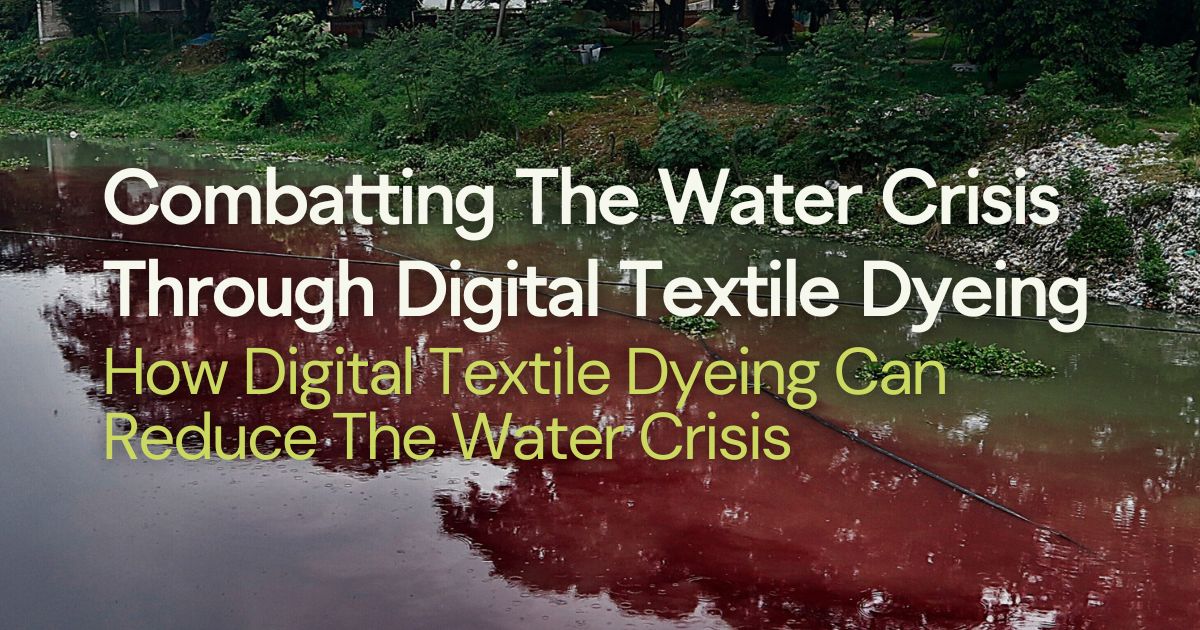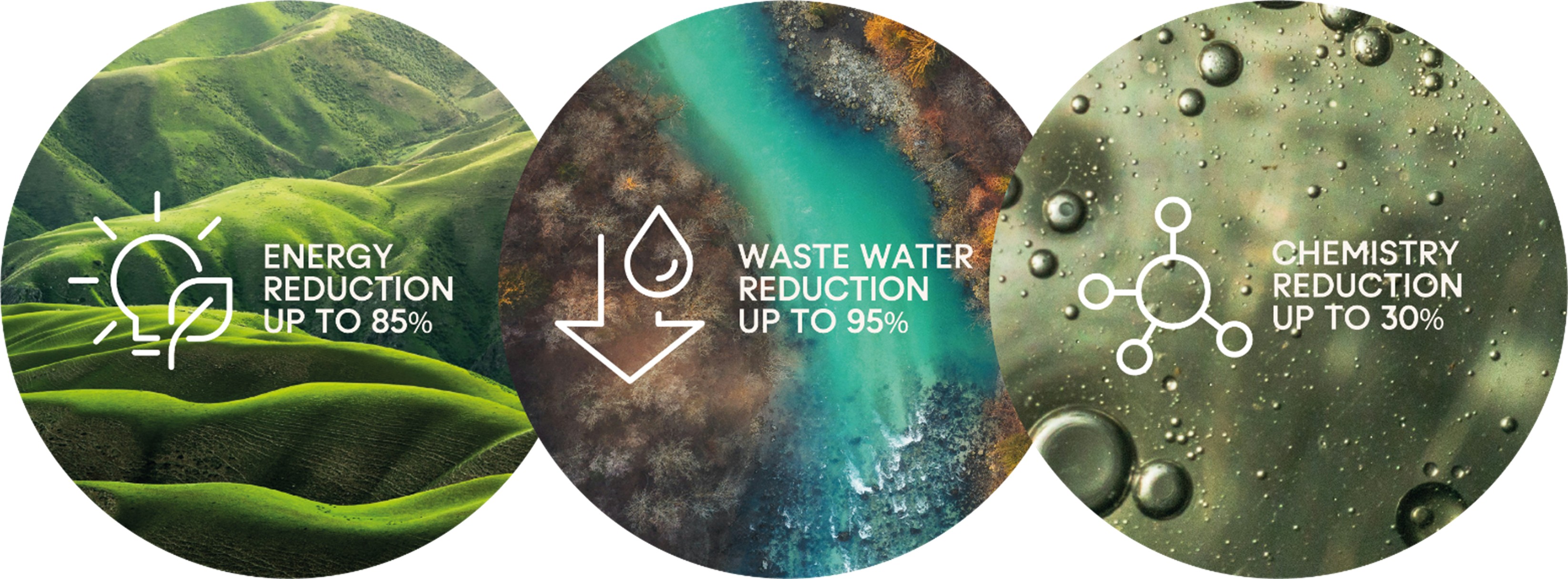
The global water crisis is the most pressing environmental issue worldwide. According to a survey by GlobeScan and WWF, 63% of people view water pollution as a “very serious” problem, ranking it above even climate change. Over 60% of people believe governments and corporations are responsible for conserving and protecting water resources, yet their actions are less than adequate.
For centuries, the textile industry has played a significant role in exacerbating the water crisis, particularly through traditional textile dyeing methods. With water-intensive processes generating huge wastewater pollution, and high energy consumption through burning fossil fuels increasing CO2 pollution, it is critical for brands and textile manufacturers to invest in clean-tech solutions to Combat The Water Crisis Through Digital Textile Dyeing.
Textile Industry: Source Of The Water Crisis
Conventional textile dyeing is one of the largest contributors to global water pollution and over-consumption. Using traditional dyeing processes such as dye baths and jet exhaust dyeing has led the industry to account for 20% of global industrial water pollution, demonstrating that traditional textile dyeing is a major Source Of The Water Crisis. What’s more, the industry consumes approximately 93 billion cubic metres of water every year, equating to the needs of 5 million people. In some regions, textile wastewater is responsible for 70% of surface water pollution, harming ecosystems, communities, and industries alike. Leading to the loss of freshwater ecosystems which are key for public health.
Despite growing awareness, many brands and textile manufacturers continue to focus solely on reducing water in their operations. Instead, the priority should be on addressing the broader value chain dependencies, wastewater management, and ecosystem restoration.
The Need For Collective Action Across The Textile Industry
Insights From Industry Experts
With water challenges expected to intensify, such as extreme floods and droughts, brands and textile manufacturers must move beyond operational efficiency and engage in collective action. According to the Future Water Agenda report, it found the following Insights From Industry Experts:
- 80% of experts strongly agree that water requires the same level of urgency as climate change and biodiversity.
- 70% of experts believe corporate water stewardship should be better integrated with sustainability strategies.
- 94% of experts emphasise the need to incorporate water stewardship into nature-based solutions.
The public also support stronger corporate involvement in water conservation. The Future Water Agenda report states:
- 89% of Latin Americans report being affected by water pollution, with 82% impacted by water shortages.
- More than two-thirds of global consumers believe companies must take greater responsibility for water protection.
- 37% of consumers prioritise pollution reduction over water use efficiency in corporate sustainability efforts.
Consumers Are Influencing Textile Policies
Existing policies in textiles are emphasising environment conservation, reducing CO2 emissions, and ensuring end-to-end traceable supply chains, from raw materials to final garments. Through their demand for sustainability, Consumers Are Influencing Textile Policies by asking more of the textile industry due to their deeper commitment to ethical purchasing and holding corporations to account.
Investors Hold The Key To Water Stewardship
While water scarcity is a daily existence for countries in North Africa and across the Middle East, it is also a growing financial risk. Experts predict that some regions could see a 6% GDP decline by 2050 due to water-related disruptions. Of those brands and textile manufacturers who experience this decline, they may face reputational damage, regulatory fines, and supply chain deficiencies.
However, Investors Hold The Key To Water Stewardship. Over 39% of experts believe investors hold the greatest potential to drive corporate transformation in water stewardship. So, The Need For Collective Action Across The Textile Industry is to adopt clean-tech solutions like digital textile dyeing that can position brands and textile manufacturers as industry leaders in sustainability and water conservation.
Tackling The Water Crisis With Digital Textile Dyeing Technology
To combat these challenges, digital textile dyeing offers a revolutionary, clean-tech alternative to traditional dyeing methods. Our innovative, digital dyeing solutions at Alchemie Technology align with public sentiment and support brands’ and textile manufacturers’ production efficiency by providing a scalable, sustainable alternative to traditional textile dyeing. By partnering with us, you will meet consumer demands, comply with regulatory pressures, while Tackling The Water Crisis With Digital Textile Dyeing Technology.
Our digital textile dyeing systems – Discovery (lab-scale digital lab dips) and Endeavour™ (full-scale production line) – drastically reduce your water consumption and eliminate wastewater discharge. Unlike traditional dyeing, which requires large volumes of water to fix dyes onto fabrics, our digital approach uses precise application as a near waterless process. Using our technologies, you will reduce your overall carbon footprint from textile production and by significantly reducing chemical use, protect both your workers’ and the public's health along with preserving local ecosystems.
 Last Call To Collaborate In Tackling The Water Crisis
Last Call To Collaborate In Tackling The Water Crisis
The data is clear: the public, experts, and investors all demand urgent action To Collaborate In Tackling The Water Crisis. Within this article, we have established several ways to do so. Transition to water-efficient, non-polluting dyeing technologies. Advocate for stronger water conservation policies. Invest in solutions that support freshwater ecosystem restorations and encourage the textile supply chain to do the same. Adopt digital textile dyeing as part of your sustainability strategy.
The textile industry has a unique opportunity to lead by example through digital textile dyeing, as a clean-tech, sustainable dyeing method. By embracing this textile dyeing innovation you are directly Combatting The Water Crisis Through Digital Textile Dyeing. Significantly reducing your wastewater output, cutting water consumption, and supporting a more sustainable future.
Take action and connect with us at enquiries@alchemietechnology.com.